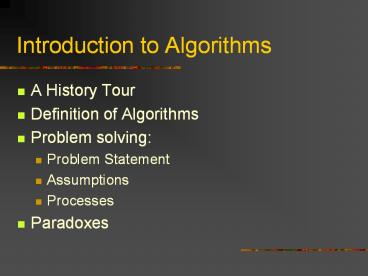Introduction to Algorithms - PowerPoint PPT Presentation
Title:
Introduction to Algorithms
Description:
Middle East abacus 3500 BC. Babylonians: Pythagoras's theorem ... Chinese: magic squares, Ptolemy (astrology) (90-150) Diophantus and Apollonius geometry (500) ... – PowerPoint PPT presentation
Number of Views:473
Avg rating:3.0/5.0
Title: Introduction to Algorithms
1
Introduction to Algorithms
- A History Tour
- Definition of Algorithms
- Problem solving
- Problem Statement
- Assumptions
- Processes
- Paradoxes
2
Brief History Tour
- Palaeolithic people counted bones 30000 BC
- Egypt (geometry, decimal system) 5000 BC
- Middle East abacus 3500 BC
- Babylonians Pythagorass theorem is known,
heights of pyramids and the distances to ships
are computed, algebraic equations were solved
(3000-1000 BC). - Pythagor geometry basics, 500BC
- Euclid geometry, 300 BC
3
Brief History Tour
- Chinese magic squares, Ptolemy (astrology)
(90-150) - Diophantus and Apollonius geometry (500)
- Fibonacci writes The Book of the Abacus, on
arithmetic and algebra (1200) - Ferma, Descartes, Pascal, Leibnitz (1600)
- Newton (physics), Euler (geometry) 1700
- Lagrange (geometry), Gauss (algebra), Bubbage
(computations), Poisson (probability), Mobius
(surfaces) (1800) - Hilbert (23 problems), Godel (inconsistency
theorem), Einstein, Poincare, Russell 1900
4
Algorithm Definition
- Algorithm is a procedure that consists of a
finite set of instructions which, given an input
from some set of possible inputs, enable to
obtain an output - Donald Knuth Computer Science is the Study of
Algorithms
5
Some simple examples
- Suppose you and I have the same amount of money.
How much should I give you so that you have 10
more than I do? - A dealer bought a book for 7, sold for 8,
bought for 9, sold for 10. How much profit did
he make? - Solution provides an algorithm.
6
Assumptions
- Each problem can be solved under a set of
specific assumptions - Examples
- Weight is given in kilograms
- Activity takes place on Earth (Newtons laws
apply) - When pouring the water into container, it does
not evaporate - Other examples ?
7
Which one is older?
- Logical problem (Raymond Smullyan)
- A brother and a sister were asked who is
older. The brother said I am older. The sister
said I am younger. At least one of them lied.
Who is older? Under what assumption the solution
works?
8
Solution
- If we assume they cannot be of the same age, then
they both lied and the sister is older.
9
A pizza puzzle
- How do you cut a pizza onto 8 pieces with 3 cuts.
What is the minimum number of slices you can get
with 3 cuts? Which assumptions did you use?
10
Solution
- 1. A piece not necessarily should have a cheese
on it (be the top one). - You can cut horizontally.
- All cuts are distinct.
11
Logical problems
- R. Smullyan The riddle of Scheherazade
- 1. Think of a yes/no question that will force
- you to tell the truth.
- 2. Think of a yes/no question that will force
- you to tell the truth.
12
Solutions
- Solution 1. Will you answer Yes to this
question? - Solution 2. Will you answer No to this
question? - The first solution is obtained as a result of
cognitive process. - The second solution can be obtained by analogy.
13
Problem solving
- Applying specific rules
- By analogy (similar problem)
- Abstraction (generalization)
- Intuition (non-ordinary solution)
14
The biggest assumption
- Math is perfect??
- In 1931 Kurt Godel came up with a startling
discovery that mathematical truth can not be
completely formalized. I.e. given the set of
axioms and rules of inference there are some
statements that cannot be proven true or false
inside this system. - This is called Incompleteness theorem
15
Paradoxes
- This leads to paradoxes
- This sentence is false
- You have no reason to believe this sentence
- Do you believe it?
16
Sources
- History of Mathematics
- http//www-groups.dcs.st-andrews.ac.uk/history/Ch
ronology/index.html - Fun Math
- http//www.cut-the-knot.com/content.html
- R. Smullyan The riddle of Scheherazade






























